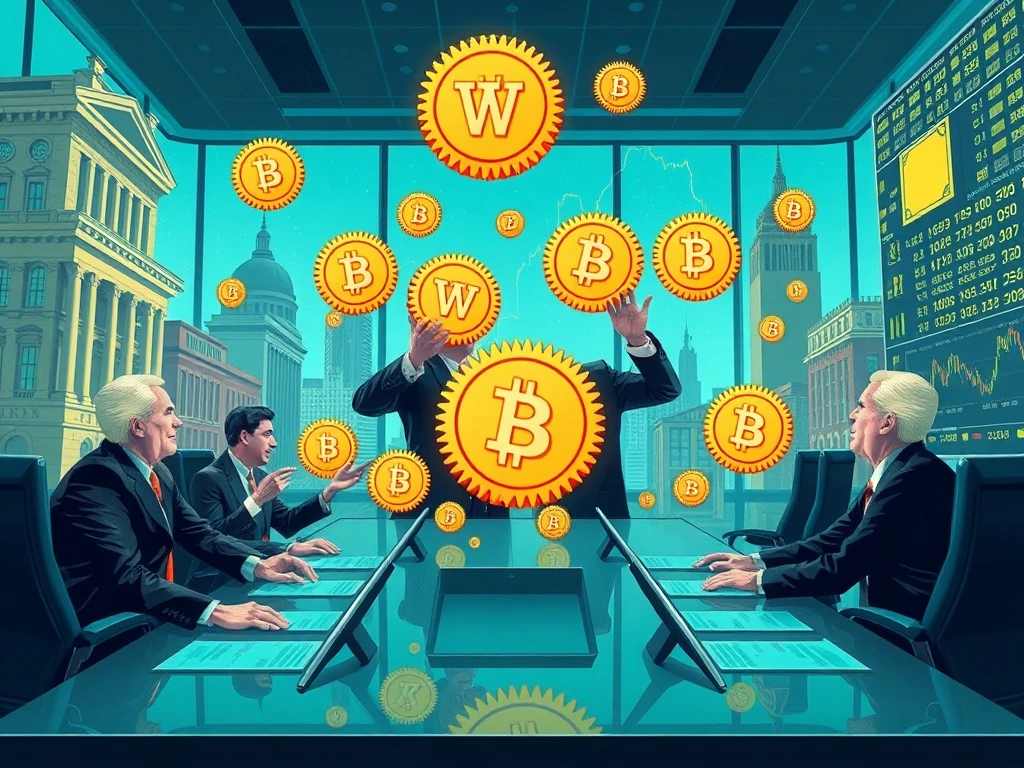The dramatic 31% price drop of World Liberty Financial’s WLFI token within weeks of its 2025 launch reveals how political influence directly shapes crypto valuations in unpredictable ways. This case study demonstrates that even in decentralized markets, traditional power structures continue to drive significant price movements and investor sentiment.
Political Influence on Crypto Valuations
Political backing dramatically impacts crypto valuations from the moment of token launch. The Trump family’s involvement with WLFI created immediate market attention, driving initial price surges followed by substantial volatility. This pattern shows how political capital converts directly into market capitalization, regardless of underlying technological fundamentals or utility.
Governance Centralization Risks
Despite claims of decentralization, concentrated ownership significantly affects crypto valuations. The Trump family controls 82% of WLFI’s circulating supply, creating governance centralization that contradicts blockchain principles. Similarly, Justin Sun’s involvement introduces additional centralization through Tron infrastructure, demonstrating how traditional power structures replicate themselves in crypto ecosystems.
- 82% supply control by single political entity
- Tron infrastructure dependencies creating technical centralization
- Governance model contradictions between claims and reality
Regulatory Impact on Market Performance
Regulatory scrutiny directly influences crypto valuations through uncertainty and compliance risks. The SEC’s Project Crypto initiative has specifically flagged WLFI’s governance structure, creating additional pressure on token performance. Political statements from figures like Senator Elizabeth Warren have caused immediate price reactions, showing how regulatory sentiment translates into market movements.
Token Economics and Scarcity Illusions
Tokenomics significantly affect long-term crypto valuations through supply mechanisms. WLFI’s buyback-and-burn program attempts to create artificial scarcity, but the looming 2025 token unlock of 24.67 billion tokens threatens to negate these efforts. This tension between deflationary mechanisms and large supply releases creates fundamental valuation challenges that political branding cannot overcome.
Market Stability Concerns
Political-backed crypto valuations face unique stability challenges compared to utility-driven projects. The Aave-WLFI governance dispute triggered an 8% price drop in Aave’s token, demonstrating how political projects can destabilize established DeFi platforms. This contagion effect shows that political crypto valuations carry systemic risks beyond individual token performance.
Future Outlook and Investor Considerations
Investors must critically evaluate how political influence affects crypto valuations long-term. While political backing provides short-term attention and liquidity, it also introduces regulatory risks and governance concerns that may undermine sustainable value creation. The coming token unlock and ongoing SEC scrutiny will test whether political crypto valuations can maintain stability without fundamental utility.
Frequently Asked Questions
How does political backing affect cryptocurrency prices?
Political backing creates immediate market attention and liquidity but introduces volatility from regulatory scrutiny and political statement impacts. This creates a high-risk, high-reward scenario for crypto valuations.
What percentage of WLFI does the Trump family control?
The Trump family controls 82% of WLFI’s circulating supply through DT Marks DEFI LLC, representing significant governance centralization despite decentralization claims.
How does token unlocking affect crypto valuations?
Large token unlocks increase circulating supply, potentially depressing prices if demand doesn’t match new supply. WLFI’s 2025 unlock of 24.67 billion tokens represents a major valuation risk.
What regulatory risks do politically-backed cryptocurrencies face?
Politically-backed cryptocurrencies face heightened SEC scrutiny, potential fraud investigations, and regulatory uncertainty that can significantly impact valuations and market stability.
How did the Aave-WLFI dispute affect crypto valuations?
The governance dispute caused an 8% drop in Aave’s token price, demonstrating how political crypto projects can create contagion effects across established DeFi platforms and valuations.
Can political branding sustain long-term crypto valuations?
Political branding provides short-term gains but requires underlying utility and sound tokenomics for sustainable valuations. Without fundamental value, political crypto valuations face long-term sustainability challenges.








